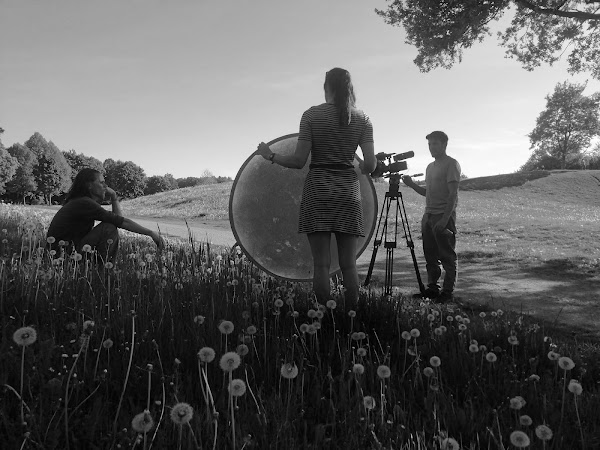Lights, camera, action… in Munich
I've known the Spanish filmmaker Jesús Pulpón since we participated in the I Flamenco Short Film Festival in 2010 and were invited to France to present our award-winning films in the Nîmes Flamenco Festival. On one occasion he rescued me from disaster when Lilián and I were filming a documentary in Seville, but that's a whole other story.
In 2020 we coincided in the presentation of his film Die Beschreibung der Bilder ('Describing the Pictures') in Documenta Madrid, where he mentioned he was working on a script with me in mind for the lead role. There is something captivating about his way of filming – time stretches out, the camera lingers on the spaces between, the story is continuous and disjointed at the same time, the audience is taken outside the frame of the shot. You can get a small taste of this in the trailer of Describing the Pictures:
Trailer of 'Describing the Pictures'
Just over a year later Jesús sent me the text to read and as it was about a couple he asked if Lilián would play the other part. His son would play our child. And so we began learning our lines.
I've had roles in school plays, and I learn my poems by heart so I can connect with the audience when I recite them. I have filmed myself in my own poetry films, such as 'The Afternoon'. I'd also recently done a presentation for children on stage in the Reina Sofía Museum, bringing to life through poetic actions and stories, a series of animations from Mexico and South America in indigenous languages. But this was to be my first time in front of the camera working with a film director, and it was a fascinating experience.
With Jesús in Munich and us in Madrid, we began rehearsals via video-calls; Jesús asking us to move the camera to focus on one or the other as we read through our lines so he could focus on each person as they spoke, or listened. The whole process of rehearsing via a computer's camera in the light of the pandemic made us think about the possibility of making a whole film in this way with people around the world.
The question whether to learn the text in Spanish or English was interesting. Initially is wasn't clear which language the film would be in. The script was written in Spanish and I began learning it as it was, because Jesús was interested in how it would work if I were to translate into English as part of my thinking process in the moment. However, we ended up working the other way around and I created a naturally sounding English translation, which, being a native speaker, was much easier to learn by heart, and then filming in Spanish.
It still wasn't easy though, as my script included a long monologue. So I took the text with me when I went running and sat in the park repeating my lines. I looked up techniques for memorizing scripts. I would watch the same videos my character watched, and Lilián got fed up with me as I introduced my lines into our normal conversations.
And so Lilián and I flew to Munich for the filming with Jesús Pulpón, his son Beleno and Karla Bauer. I love how stories are created, how they become a script, how the process of making a film has its own story – friendship, cooking and eating together, the creativity needed when working with children, the moments of doubt, of trying different locations, working with changing light and sound – and we were also able to visit Munich, dance in the Hofgarten, eat pizza by the river, wander the streets.
The story continues with Jesús visiting us in Madrid a month later to film extra material, and the process of editing and preparing the film to send to festivals. It is part of his master's project at the HFBK film school in Hamburg. I've only seen a rough edit so far but I'm really looking forward to seeing the final work.
—Photos of the filming in Munich by Lilián Pallares and me.






Comentarios